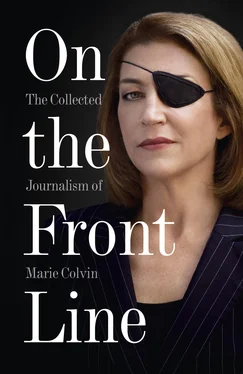The PLO is Arafat’s life and he expects the same commitment from everyone around him. He accepts planes and villas from Arab leaders, but remains a nomad and just out of their control. All his villas look the same – sterile, furnished with a print or two of Jerusalem, a television, some nondescript sofas and a desk. The head of the Palestinian government travels in four suitcases: one for his uniforms, one for his fax machine, one for ‘in’ and ‘out’ faxes and one for a blanket to curl up in for cat naps.
His obsessive precision can be maddening. He arranges his keffiyeh headdress meticulously every day in the same way. It must hang down his shoulder in the shape of the map of Palestine. He empties his machinegun pistol precisely as his jet takes off, carefully lining up the bullets on his tray. He marks every single fax sent to the PLO with a felt-tip red pen. But doubts begin to set in when one spends a lot of time around him. Does Arafat really have to read every single fax? Does he have to control every disbursement of funds, the purchase of an office desk in Singapore? It is Jimmy Carter as PLO leader.
Arafat is up on every detail of running the organisation, but never takes time to review policy, listen to advice or plan ahead. The PLO is run from moment to moment from Arafat’s head. The main criticism one hears in the ranks of the PLO is of this autocratic style. Arafat brooks no criticism and, as a result, many educated and independent Palestinians have opted out.
Now, when he desperately needs good advice on the workings of the western world as he tries to convince it that he is sincere in his current drive for a peaceful settlement with Israel, few around him know its ways. He himself is unsophisticated about the West, not surprisingly, as he spent most of his youth organising a resistance movement and has been banned from most of it for his adult life.
So why do Palestinians follow this unlikely leader? In person, Arafat is warm and inspires devotion. Palestinians who disagree with his views respect his devotion to the cause. He has always managed to compromise and lead by finding the highest common denominator within the fractious Palestinian movement. Arafat has no political ideology. He wants one thing: to liberate the homeland of his people. He has become more than a leader. For most Palestinians he is a symbol of their aspirations.
Arafat today is a desperate man. He is 60, has no heirs, and wants to achieve something tangible before he dies. In renouncing terrorism and recognising Israel in 1988, he played his best card and cannot understand why he has not received more support from the United States in convincing Israel to make a similar concession.
Arafat is now flying around even more obsessively than when we were filming, trying to stave off attacks from radicals within his own organisation and from Arab states who say he has given everything in return for nothing. Arafat is hoping to convince enough people to stay with him, hoping to keep the organisation together long enough, hoping to stay alive long enough, so that he can one day land his own plane in Palestine.

Home alone in Palestine: Suha Arafat
19 September 1993
When Yasser Arafat went to Washington, his wife stayed in Tunis. But she wasn’t hiding away. Marie Colvin profiles the determined Mrs Arafat.
Suha was never going to have it easy. She faced an entrenched PLO bureaucracy where proximity to Arafat meant power. But there was little they could do: by all accounts it was a love match. For the historic peace deal last week, Yasser Arafat wore a uniform, a keffiyeh that caught the slight breeze like a jib sail, and the designer stubble it might be said he pioneered. His wife Suha wore red. But while he was standing on the White House’s South Lawn, the PLO leader’s 29-year-old, French-educated wife was sitting at home in the couple’s whitewashed villa in Tunis, while the wives of Bill Clinton and Yitzhak Rabin were escorted to their seats on the South Lawn.
Arafat would no doubt have liked her to attend, but his advisers counselled him that bringing along his chic young wife would set Palestinian conservatives and radicals alike clucking away that he was treating the signing of the Palestinian–Israeli peace accord as a social event. They shuddered at the imagined sniping: Palestinians are dying in Gaza and she is parading herself in the White House.
So the Arafats were foiled. Well, not quite. She snapped on her gold earrings, donned her favourite Paris couture suit, a tasteful scarlet number decorated with jewelled buttons, and invited the CNN correspondent Richard Blystone to come and watch the ceremony chez elle. Blystone brought along a satellite dish and broadcast Suha’s thoughts and plans live to the television audience of several million watching the historic ceremony.
Standing on the mosaic portico of the marital home, she told Blystone how she was happy ‘to stay with my people in Tunis to share with them this great historical moment’.
She spoke of her future role as the first lady of Palestine in echoes of Hillary Clinton. ‘I think I have to assume great responsibilities. I must concentrate on health care for the casualties of the intifada and for all the Palestinians all over the world, to compensate for their long years of suffering.’
The public relations coup epitomised her deft manoeuvring since Arafat, a confirmed bachelor who for years had vowed he was ‘married to Palestine’, shocked the Palestinian community in July 1991 by wedding a pretty blonde less than half his age.
She recalls first hearing of her future husband when she was four years old and ‘hiding in fear’ in her family’s basement in Nablus as Israeli soldiers searched the West Bank city for a resistance leader named Arafat. In 1988, because of her fluent French and the long association of her mother Raymonda with the PLO (she founded the first Palestinian news agency in the occupied territories), Suha was asked to help out during an Arafat visit to Paris where she was living after finishing her education at the Sorbonne.
Within weeks Arafat asked her to come to Tunis as his personal assistant. Soon she was flying around the world with him and had supplanted his long-time secretary, Um Nasr. When he married Suha, there was a hair-pulling cat-fight between the two women at Arafat’s office. Um Nasr, a forty-something woman who had dedicated her life to the revolution, felt that she would make a much better wife.
Much of the resentment of Suha seems inspired not by anything she has done but rather by what she is. She is neither a traditional Arab wife in a culture that is still very conservative, nor is she the politicised revolutionary that many assumed Arafat would choose were he ever to wed. She likes French fashion and perfumes and visits Paris to stock up. Her upper-class trappings rankle among Palestinians more than the difference in age or religion (she is a Greek Orthodox Christian, he a Sunni Muslim).
For years Arafat’s nomadic existence and paucity of possessions had been a symbol of his refugee people; now Palestinians had a first lady who said: ‘It’s so difficult to take all of the luggage and go all over.’
But Suha is no bimbo. She comes from a prominent Palestinian family; her father is a wealthy banker and likes to talk of how her ancestors lived in a crusader castle. She is trying to carve out a middle role, somewhere between being a traditional wife and a public figure in her own right.
She recently took along a film crew with her to visit a Palestinian orphanage in Tunis to publicise their plight. Arafat has symbolically adopted all the children, most of whose parents are considered martyrs of the Palestinian cause. And she has founded a society to care for Palestinian children.
Читать дальше













